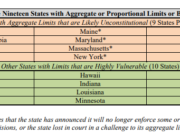By now everyone’s heard (well, everyone who cares about campaign finance regulation has heard) about the Obama (c)(4) “Organizing for Action,” and there’s some debate in free speech circles about whether or not the Obama administration’s obvious bumping up against the hypocrisy line is something to be lauded or lambasted. Do we, for example, congratulate Obama for embracing the (c)(4) as a model — despite, of course his four-year diatribe against dark money and outside groups that never have to report donors buying elections? Or, do we take a minute to stop and acknowledge that the chances that the free political speech crowd has managed to convert the Obama campaign team is pretty slim and perhaps there’s another agenda at work?
Dave Weigel of Slate thinks he knows the proper way to look at the issue in writing about the new ad from Crossroads that essentially calls OFA a late-night cheap product intended to bilk you of your money:
The implication of the ad is that OFA’s buckraking is more than obnoxious, more than insulting—it might be illegal! After all, it’s akin to Bill Clinton and Al Gore’s 1990s fundraising scandals, real contravention of contemporary law. I posed this theory to Crossroads’ Jonathan Collegio. “I think you might be reading a little too much into it,” he said. I tend to do that. But the POTUS’ allies are able to raise more legal money, more shadily, because of the war of attrition on donation limits. If a lawsuit joined by the RNC is successful, individual donors will be able to hand bigger checks to candidates—not just lame ducks.
Perhaps he’s right, although personally, I don’t think the hypocrisy is innocuous. I’m willing to give credit where it’s due and acknowledge the change of tone. But the best predictor of future behavior is past behavior so my guess is, once the (c)(4) model becomes less politically useful, they’ll be back to crying about evil corporate interests jack-rabbit quick.
But I think the other points Weigel makes are far more interesting. Because contribution limits and the relationship between parties/candidates/super PACS — and the fact that states are starting to wonder if candidates should be competing with super PACs and are making changes to their contribution limits as a result — is a far more compelling part of the continuing story of money in elections.
But statewide candidates in 2012 elections from Democratic and Republican parties have suggested to Committee Chairwoman Jeanette White, D-Windham, that the advent of Super PACs in Vermont means that candidates need to raise more cash to compete. It’s a refrain that has also been heard from the Democratic and Republican state parties in recent weeks.
“What they told me is that in a world without Super PACs, lower limits were more reasonable,” White said to her committee. “But it’s a whole new world with Super PACs that have unlimited contributions. And unless we can limit the contributions to Super PACs … they need to have higher limits.”
Pollina fired back that this reasoning “sets up a scenario where everyone tries to outspend Super PACs, which no one can do, instead of finding a way to control the Super PACs.”
Expect more of this kind of thing from other states as the Supreme Court examines the McCutcheon case and the Obama administration rakes in tons of cash to push an ideological agenda using the super PAC model.














